So many iconic images have come from these films and have been parodied or referenced by other things that they have become interwoven into the fabric of pop culture. Not to mention these movies are the only reason everyone knows Eye of the Tiger or what the Philadelphia Museum of Art's steps look like.
 |
| The steps he just run up by the way, in case you weren't sure. |
However, the movies are often critiqued as being predictable or sappy, with overly saccharine elements and sport movie cliches. Now, while I can't argue that the movies are sentimental (and definitely did get sappier as the series progressed), I think there is a lot more going on in these films than their reputation as dumb Sylvester Stallone boxing movies often warrants them.
Some people criticise the movies as trite sentimentality, and while that seems more the case for the later movies, for the the first two their endings feel satisfying because they are earned. Rocky starts at the bottom and has nothing going for him and has to face insurmountable odds as a real underdog, so it's great to finally see him succeed at the end.
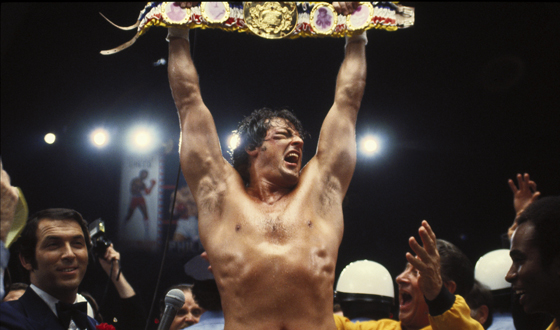 |
| He did it! |
There is a long sequence in the second movie where he's unemployed and starts losing all the things he had, getting a job in the meat factory, then losing that job, and so on. This sets up how low he is at that point for the climb to the finale and when he wins, it is triumphant because it is earned.
You see the hard work he had to put in, the obstacles he had to face, and the determination he had to see it through which warrants the happy ending and prevents it from being sappy... at least until the later movies which ramp up the triumphant factor to 11.
Now full disclosure, I only finished watching the Rocky movies for the first time this week after binge watching them on Netflix. Also, I only watched Rockies I to IV since to be honest, I just didn't want to watch the last two which seemed like appendices to a series which seemed complete at the end of fourth movie.
 |
| There's nowhere to go but down after you've punch the Cold War in the face. |
So like I said, I had never seen the movies before although I was obvious very familiar with the character of Rocky and the movies through pop cultural osmosis because of the countless references and parodies of iconic scenes from the films like the training montages or running up the Rocky Steps or Survivor's "Eye of the Tiger".
Therefore, it was really interesting to watch these films with fresh eyes since I had an awareness of the character and what the movies were about (boxing, training montages, and patriotism) but I was struck by how little the first two movies seemed like the character of Rocky I knew from pop culture.
 |
| "Yo, what do ya mean about that?" |
Since Rocky in the original two movies is slow. He's not just unintelligent but slow. Stupid is as stupid does, as Forrest Gump would say. It's actually a fantastic performance from Sylvester Stallone who embodies Rocky with this sincere simplicity, that although he's borderline mentally challenged, he's so sweet and simple that he's endearing. Actually 'simple' is probably the best word to describe the character of Rocky, which is probably why I said it twice.
Now, this isn't to say that in the later two movies that Rocky suddenly becomes this intelligent or smart character but he's no longer slow. It's immediately noticeable from the first scene in Rocky III where Rocky no longer seems simple. Maybe still not entirely articulate or clever, it is definitely a different portrayal of the character since he is far more articulate that he ever was in the first two movies.
In the first two Rocky movies, Rocky seems barely capable of stringing a coherent sentence together, taking a while to collect his thoughts and get out what he wants to say. This is not to say that he doesn't talk, in fact, he is constantly talking, often telling non-stories and bad jokes trying to connect with people (remember that thing about connection, it comes back later).
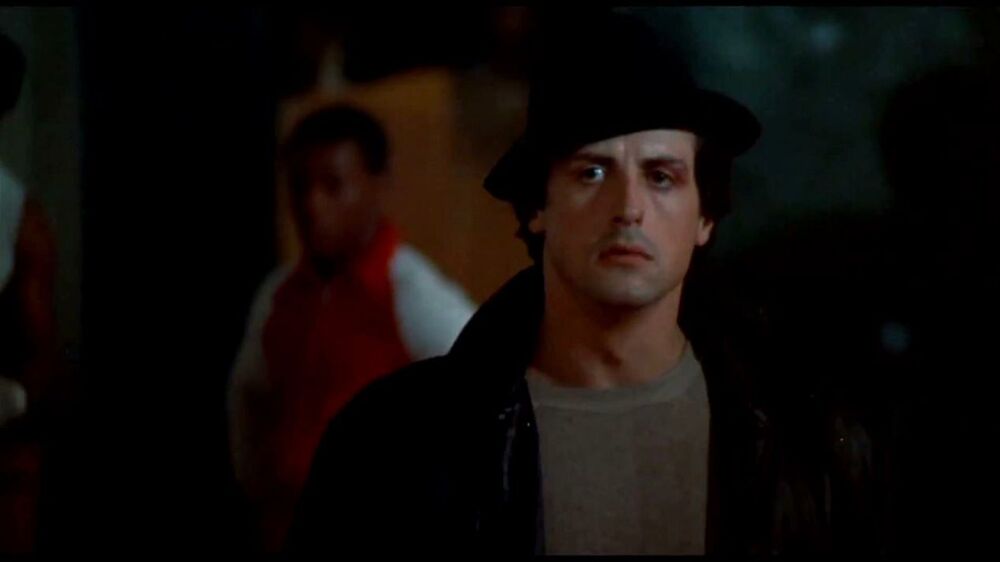 |
| "I dunno I like what ya saying about me." |
Most of the first movie in fact is Rocky talking and talking to people who may or may not want to talk to him. Going on in his monosyllabic way, drolling out the words in his thick Italian American accent and slow manner of talking.
And the movie is fully aware of how slow Rocky is. The character himself understands and repeatedly tells people that it is just the way he speaks and that he isn't too good with words. In the first movie, he knows that the TV interviewer is kinda making him out to seem dumb and that's how people will see him.
This isn't a blissfully dumb character like Forrest Gump but someone who isn't that smart with a limited education (he left school in 6th Grade and has trouble reading) yet is fully aware of his mental limitations and how people perceive him. And he constantly wants to change that perception, to not be seen as a bum.
 |
| Although it might help if he didn't spend all his time just wandering aimlessly around the docks. |
But what I didn't expect from the Rocky movies is that there is a real tender and heartwarming love story at the core of series between Rocky and Adrian. And the first movie is actually all about the blossoming of their relationship as he manages to get her to get out of her painfully shy shell and begin to feel confident in her own skin.
Remember how I mentioned how Rocky seems to be trying so hard to connect with someone? (I told you it would come back) Well, the person he really wants to connect with is Adrian but because she is so closed off from the world and introverted he has to continually try to get her to open up little by little essentially just by constantly talking to her.
And for most of the first movie, Rock is a lone figure, walking the streets and docks of Philadelphia by himself bouncing his bouncy ball, bumping into people and saying hi but always on his own. Really the two major themes of the movie are Rocky proving to himself and everyone else that he isn't a bum and can go the distance, and the love story between Rocky and Adrian.
I never knew this, since it isn't apparent from the image of the triumphant Rocky from pop culture, but [Spoiler] he loses the fight at the end of the first movie against Apollo Creed. However, Rocky doesn't care since all he does after the fight is scream for Adrian as she makes her way to him and they declare their love to each other in a rather touching finale, which like I said above, feels earned.
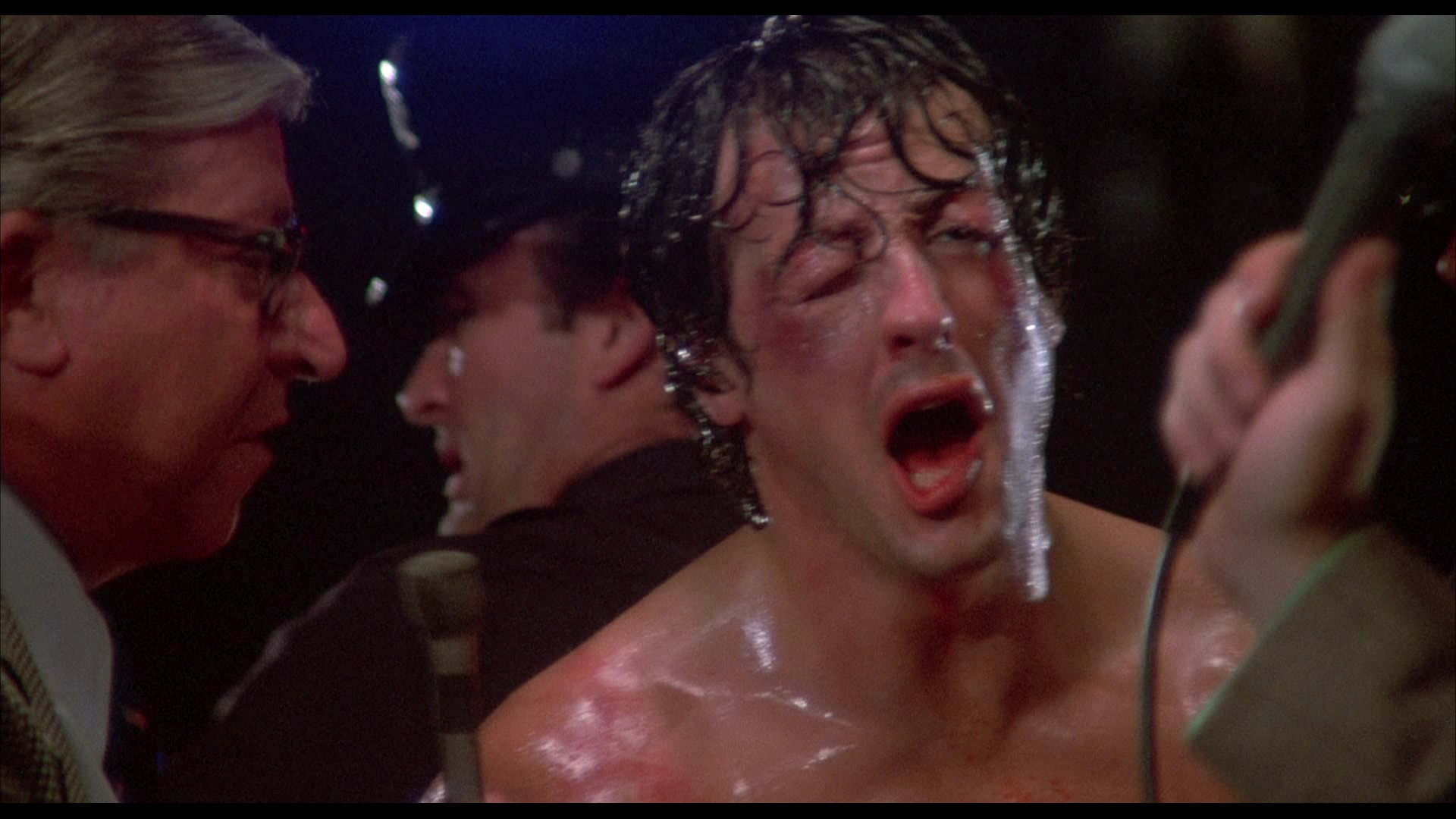 |
| "ADRIAN!" |
Adrian is a rather interesting character too since she is so ridonculously shy at the start of the film. She is constantly looking down and unable to speak, reacting to every attempt at a conversation from Rocky with a nervous smile and awkward attempts to leave. And the transformation into the more assertive yet still quiet person she develops into is slow and well paced.
It isn't a mid-movie transformation like those Sandra Bullock movies from the 1990s where once she removes her glasses and lets her hair down, she is a completely confident sexpot. Rather she slowly becomes more comfortable and confident as the film and her relationship with Rocky progresses.
And the final scene of the movie highlights that progression by how she starts tucked away in the locker by herself then eventually moves to the back of the stands, to closer to the ring, until she is pushing her way to Rocky at the end of the fight to declare that she loves him, completely opening herself to him. Fully out of her shell as it were.
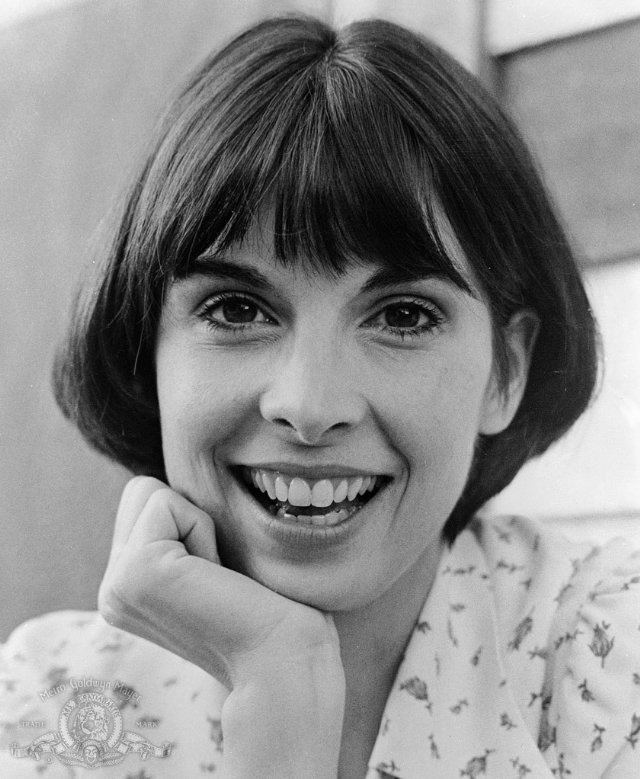 |
| Can we just stop for a moment and appreciate how cute Talia Shire was? |
On a side note, the movie does seem to have something to say about machismo culture which not something I think anyone expected me to say about Rocky nor I think anything that has been mentioned about the film, seeing as it's dismissed as a predictable and sappy loser-to-hero boxing film.
Now, how of much of this was just a product of its time and how much of it was actually meant as a bit of social commentary is a little tricky but I'd like to Stallone the benefit of the doubt here since he gets a bad rep usually. Where it seems apparent the film is trying to make some comment or other on machismo culture is with the character, Paulie, Adrian's alcoholic and abusive brother, Rocky's best (only?) friend.
Paulie is the anti-Rocky: lazy, angry, bitter, and just unpleasant to be around. He's aggressive with Adrian, shouting at her and constantly putting her down where Rocky is calm and accepting, constantly giving her compliments. Essentially it seems like Paulie is who Rocky could have become if he wasn't such a sweetheart and dedicated. A bitter hanger on who takes out his anger on women while feeling entitled to things without the hard work. A douchebag to put it in another way.
 |
| "Eh, what ya gonna do?" |
He's completely unsatisfied with his job and his life but doesn't take any action to improve it, blaming everyone else for his predicament because he's a misogynistic racist who can't really take responsibility for the way his life has turned out so he blames others, mostly women.
Before getting into race, since that is coming, probably worth a mention that another thing that is interesting is that the movies get progressively shorter with each new installment and began focusing more on the boxing. There is actually not that much boxing in the first movie, and even less in the second since he spends the majority of that movie not wanting to fight no more.
 |
| A large chunk of the movie is just Rocky and Adrian doing stuff which I have no problem with since look what an adorable couple they make. |
In the first two movies, the inciting factor that starts Rocky down the path to fight takes much longer to get started while in the second two movies, since Rocky is on top at the beginning of those films, the inciting factor (losing the fight to James "Clubber" Lang in III and the death of Apollo Creed in IV) happening pretty earlier on.
In the later two movies, it is about his climb back to the top and how he trains to get there which are the main hooks. In comparison, the first two movies almost seem like character studies in how dedicated the pacing is, taking their sweet time to build to the climatic final fight, letting the characters develop rather naturally.
Oh yeah, race. Now this will take some background since the 1980s had a different way of handling race in pop culture than today or other decades. It did this basically by acting like racism was over and everything was cool now, right guys?
 |
| "Yeah... we're cool..." |
As they discuss in the first third of this podcast while talking about Teen Wolf, the way race was handled in movies from the 1980s was by simultaneously celebrating the parts of black culture which white society liked but still ending with the message that whiteness is the way to go at the end of the day.
Essentially, werewolf = black culture in Teen Wolf (better and flashier at basketball, breakdances, and gives complicated high fives) but the morale of the movie is that Michael J. Fox has to learn to accept his human side and not wolf out. And you can see the change in the depiction of race as the Rocky series continues.
In the first two Rocky movies from the 1970s, Apollo Creed is set up as the antagonist who creates the opportunity/challenge for Rocky to face. However, in the second 2 movies, he and Apollo become best friends, and in fact in the third film, Apollo trains Rocky to fight the black boxer, Clubber Lang played by Mr. T who seems almost like a caricature of the militant Black Panther character.
Here it is explained in video form:
However, where again the Rocky movies are kinda dismissed, this time as a product of their time and subtly, although unintentionally, racist, I think there is more there and they deserve a bit more credit. Because there are moments that suggest the movies are more self-aware about race than they initially let on.
In the first Rocky movie, a new reported makes a comment about Apollo fighting a white man on the bi-centennial anniversary of the country and Apollo retorts "what about him fighting a black man?" while Rocky II, Apollo's trainer tells him that if he pushes for the fight with Rocky, the publicity will make him out to be the bad guy which he acknowledges. Both of these exchanges suggest a passing (if naive) awareness of race relations.
And in Rocky III, the worst offender coming out in 1982, at one point Paulie says that he does like 'those people' at the mostly black boxing gym Apollo has taken them, to which Rocky replies, "well maybe they don't like you". This takes Paulie back since he never thought of it that way and exclaims, "what I do to them?"
Now, none of this excuses the somewhat problematic issue with race these films have but it does give them a little more credit than simply being dumb unintentionally racist films with no thought or awareness.
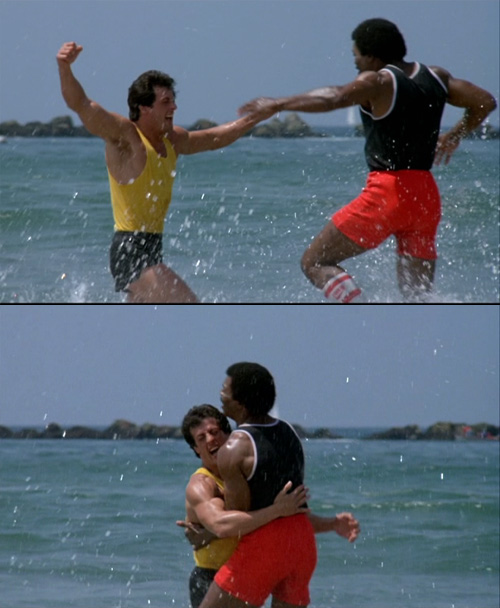 |
| And honestly, nothing should take away from the homoerotic man-love apparent in this scene. |
The last thing I want to touch on is patriotism, since that is what Rocky IV is all about. Like Daniel says in reply to Soren's claim that it is the "greatest American movie ever made" in the video linked above, "It's certainly the most American [movie ever made]". And it's true. The movie is bursting with over-the-top and obnoxious patriotism which is somehow kinda endearing if absorbed in a ironic way.
But where that becomes interesting is just how utterly in-your-face and blatant the patriotism is, especially since that was exactly the type of showy patriotism which was made fun of in the first Rocky movie.
For the final fight Apollo Creed comes out dressed as George Washington riding in 'boat' as he makes his way down to the ring. He then takes off the Washington get up to reveal a red, white, and blue coat before he puts on a big Uncle Sam top hat.
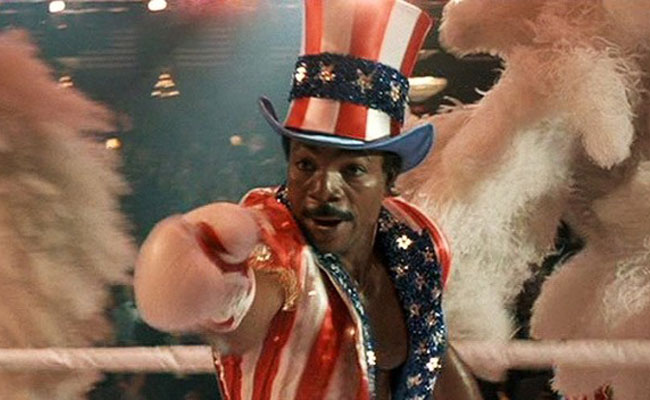 |
| "He looks like a big flag" - Rocky's actual response in the movie |
In the first Rocky, that type of over-the-top patriotism is seen as unnecessary showy and a bit ridiculous but by the time the fourth film comes round, the series completely embraces that overt patriotism as Rocky literally fights a Russian to end the Cold War. The real world took a few more years to catch up but basically Rocky ended the Cold War back in 1985 when he knocked out Ivan Drago and won over the Russian government.
Alright, I know I said patriotism was the last thing I wanted to talk about but there's just one more thing, the Rocky movies are all anti-technology or professionalism. Every single training montage in the film where Rocky successfully gets better and get ready is one where his crappy DIY meat-punching, beach-running, mountain-climbing training is highlighted against more technologically advanced or sophisticated training methods used by his opponent.
This is apparent in the first two movies in contrast to the expensive and top of the line facilities and training used by Apollo Creed compared to Rocky's far more modest training techniques (including chicken catching). However, it is most stark in the fourth film, where Drago is shown training in the most high-tech facility imaginable surrounded by trainers and scientists while Rocky trains in the Russian wilderness, even growing a hobo beard as is fitting for the snowy Russian landscape.
The exception to this is Clubber Lang in Rocky III. In that movie, it is Rocky who is the one who is training in the high tech facility amidst a media circus while Clubber is training in a run-down gym without the best equipment, closer to Rocky's training in the first film. And that's why he wins the first fight in the movie, since his training was non-technological and homemade.
In another movie, Clubber would be the protagonist as the scrappy underdog who is hungry for his chance to make it and Rocky III does do a good job of showing his determination and hunger which is another reason I kinda want to give it some slack despite the other issues with race.
It depicts the hard work and dedication Clubber puts in which is something rare for black characters in the 1980s. Too bad he talks like a caricature and they have a 'good' black guy teach the white guy moves to beat the 'bad' black guy but whatever.
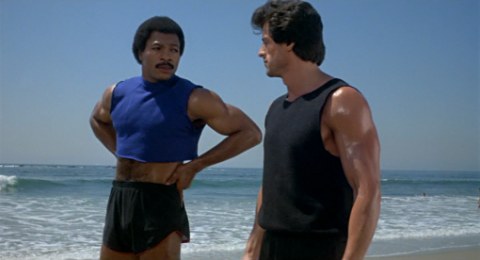 |
| "Yeah man, it's cool. And shut up, I'm totally pulling off this shirt. You just can't handle my midriff." |
I guess I'm saying that after watching the Rocky movies for the first time, they are definitely more than their reputation or the pop cultural image of Rocky suggests and that I totally enjoyed them. Like a lot.
There's a lot to digest and look into the films despite their status as dumb sports films starring a monosyllabic action hero. Also, they probably contain the two of the greatest love stories of the 1970s and 1980s within one franchise, Rocky and Adrian throughout the series, and Rocky and Apollo in the second two. And that's no mean feat.
References:
Rocky Wikipedia page
Rocky (film series) Wikipedia page
Rocky - Adrian! (1976)
Dumb Movies That Will Be Studied by History - The Cracked Podcast
The 3 Worst Lessons Taught by 80s Sports Movies - After Hours
No comments:
Post a Comment